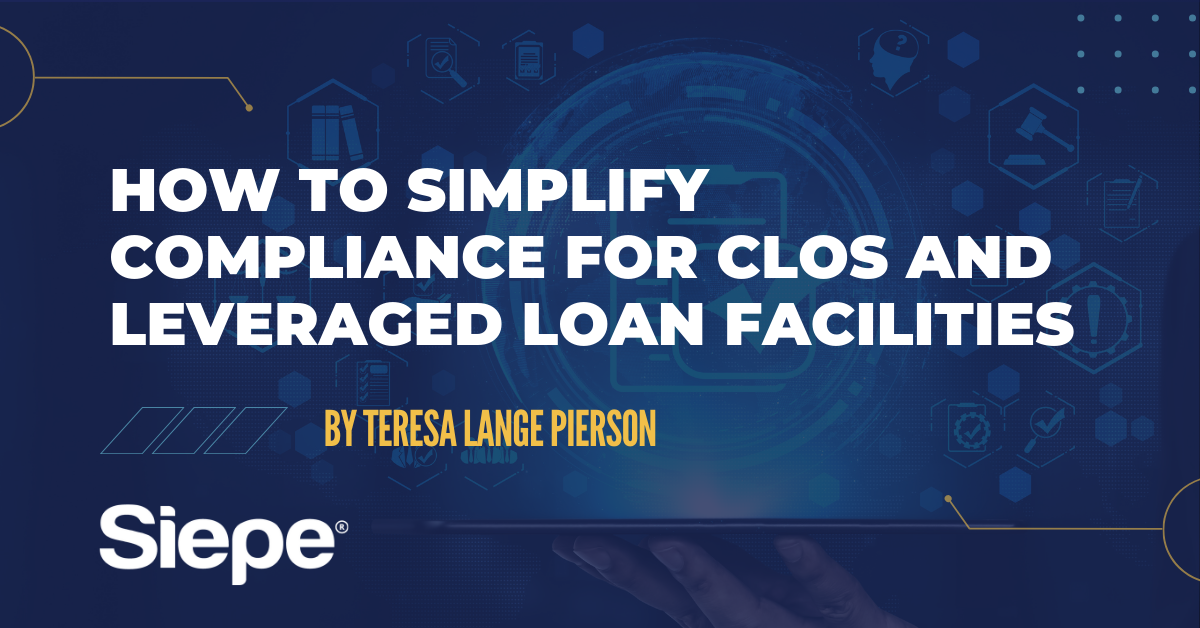By Teresa Lange Pierson, Director of Compliance
When most people hear the word “compliance”, it will often have connotations of external oversight and the consequences of failing to uphold necessary standards, such as regulations, conduct and enforcement actions. However, operationally within the Collateralized Loan Obligation (CLO) and leveraged loan space, compliance has a different meaning: it encompasses the processes outlined in legal documentation that govern the assets and agreements managed by fund managers. This includes a range of critical elements, such as compliance rules and documentation structure, the tests assets have to pass in portfolios, the maintenance of borrowing bases, and securing additional funding.
The trouble is, fund managers can find compliance daunting and overwhelming. The nature of these processes is incredibly complex and can require extensive manual effort to be managed effectively. To make things worse, many fund managers in this space are still reliant on outdated compliance systems and spreadsheets, which are not only inefficient and error-prone, but also costly, limit scalability and have single-person risk.
Additionally, there is a lack of standardization in the industry for financial reporting and the interpretation of terms and agreements, particularly since each transaction in leveraged loans markets is individually negotiated. This often forces fund managers into using spreadsheets for managing lender calculations for borrowing bases. These spreadsheets are largely separated from the rest of compliance processes, creating inefficiencies, and often lack the nuance needed to assess collateral value effectively. At the same time, the industry is plagued by data fragmentation, forcing managers to use multiple systems and data sources for CLOs. This increases compliance risks and limits transparency for comprehensive insights across these types of investment vehicles.
These issues are further compounded by the lack of innovation and reluctance to overhaul legacy technology infrastructure due to concerns about disruption and cost. The current market solutions often offer a rigid, “all-or-nothing” approach that lacks flexibility and integration options. So what can fund managers do to simplify and effectively manage compliance workflows?
Finding the right solution
When looking for a software solution to help optimize compliance processes, a key consideration is ensuring that data can be integrated at the deal, portfolio, and collateral levels. This offers a data-driven approach that streamlines access to both public and proprietary information, allowing fund managers to meet the compliance needs of CLOs and leveraged investment vehicles.
Additionally, software solutions need to be able to automate the creation of compliance rules and tests for every investment vehicle. This will help transform manual, people-driven processes into efficient, technology-driven workflows. A comprehensive and effective solution should also be able to:
- Integrate seamlessly with existing technology to avoid costly and disruptive “rip-and-replace” approaches
- Aggregate and centralize data from multiple sources into a single platform, helping to enhance data accuracy, transparency, and decision-making
- Offer scalability for both compliance and data management processes as a fund manager’s portfolio grows, without impacting operational performance
- Provide advanced analytics, with tools for pre- and post-trade compliance, hypothetical trade scenarios across multiple funds and trades, and in-depth portfolio analysis
By addressing these key areas, fund managers can streamline operations, reduce risk, and gain deeper insights into their portfolios – ultimately leading to improved compliance and better investment decisions.
As the CLO and leveraged loan industry continues to grow exponentially, managing compliance solely on manual processes and spreadsheets is not sustainable. Firms need to embrace technology and innovation to truly gain perspective on the portfolios they manage. By leveraging advanced compliance tools, fund managers can better understand the terms and agreements within CLO and position themselves for success in an increasingly competitive market.
To learn more about how Siepe can provide the tools to support all your operational compliance needs, contact help@siepe.com.

